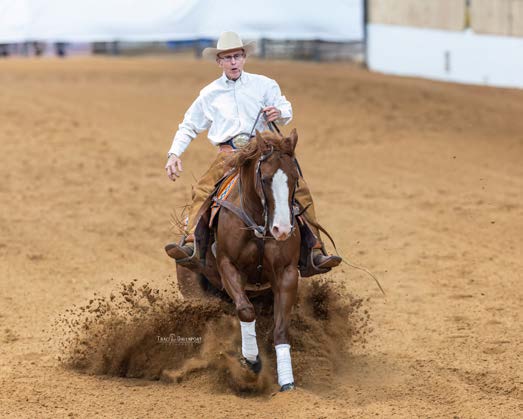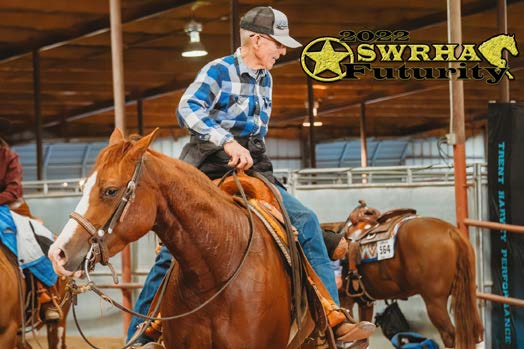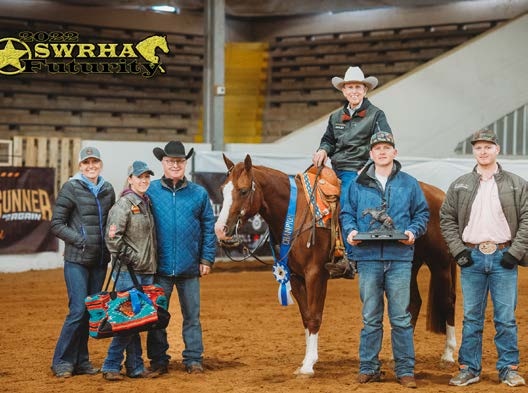
In January of 2022, retired veterinarian and NRHA Million Dollar Rider Jim Morgan, and his wife of 13 years, Kim, were enjoying the vacation of a lifetime in Maui, Hawaii, watching a golf tournament at the Kapalua Golf Course. They felt privileged to be able to play the same course as the professionals after the tournament had ended. The weather was perfect, and they had the time of their lives.
Dr. Morgan described the vacation as dreamlike. He said, “It seems like we were only there for 10 minutes when we were there for 10 days. We smiled the whole time; we slept with our smiles on.”
Dr. Morgan is an avid reiner and Kim is a carded judge and professional Arabian horse trainer, so they both had busy show schedules planned for the rest of the year. About a month after the vacation, the couple was attending one of those shows in Scottsdale, Arizona. It was an Arabian show that Kim was judging, and it was where Dr. Morgan experienced the first symptoms of a life-threatening illness. “I got sick to my stomach, and I was itching all over my body – like I had poison ivy, and after going to two or three doctors over there, I still didn’t know what was wrong with me,” he explained.
The Morgans flew home, and at the advice of a friend, sought out Dr. Hurbert Zeh, III at UT Southwestern University, an internationally renowned surgeon and Chairman of the university’s surgical department. It was he who delivered the devastating news that Dr. Morgan had cholangiocarcinoma, in short, cancer of the bile ducts.
Symptoms of the rare but aggressive form of cancer include yellowing of the skin and eyes (jaundice), intensely itchy skin, and white stools. Statistics have shown that the five-year survival rate for patients is only 10 – 15%, but Dr. Morgan couldn’t have been in better hands.
Dr. Zeh described a surgical procedure that would be necessary to save Dr. Morgan’s life, known as the Whipple procedure. As a medical professional himself, Dr. Morgan understood the implications of the surgery all too well. After further research, he was determined not to undergo that surgery if he could keep from it. He pleaded with Dr. Zeh to do a modified Whipple on him rather than the full surgery, as he had learned in an option for some patients, but he wasn’t one of those patients. Although the cancer
hadn’t spread anywhere else, making radiation and chemotherapy unnecessary, only the complete and
intense surgery would save him. His 0.9-centimeter tumor was blocking his bile duct like a ball valve so that bile could not pass into his small intestine and digestion was next to impossible. Dr. Morgan would have to rest on the fact that Dr. Zeh had performed more than 1,800 Whipple surgeries and was the best man for the job.
The robotic surgery took place on March 28 and lasted five-and-a-half hours. Dr. Zeh described it as a textbook case, as a typical Whipple generally takes at least ten hours.
While Dr. Morgan was expected to leave the hospital in three days, he was kept for ten because of the
tremendous pain that he experienced. His saving grace was his faith and that of his wife. “She was so strong,” he said. “She never left my side. She slept on the floor or on the window sill of the hospital room for the whole ten days. She kept assuring me that I was going to get better. She knew that I would get better and that I would get to ride again. She is a strong believer, too. Other than accepting the Lord Jesus Christ as my personal Savior, marrying my wife was the best thing I ever did in my life.”
It was post-surgery that Dr. Morgan felt the full weight of survival. He quickly wasted away. His stomach was in a state of paralysis due to the shock of the procedure. He could barely handle the clear, liquid diet that he was assigned. Nothing tasted good and everything made him nauseous, including water. “I was sick to my stomach 24/7 for three months,” he said. “I lost over thirty pounds, and I only weighed 155 pounds to begin with. I looked like an Ethiopian. I had to stop looking in the mirror because what I saw there was so terrifying. I was so weak that I could hardly walk, much less shower or dress myself. I couldn’t bend over, or I would fall down. My wife had to do everything for me.”
Kim cooked anything she thought her husband could handle eating, and sometimes he could and other times he could not. She helped him with all of his basic needs and continued to encourage him and pray with him as slipped into a deep depression. “That depression was something that I had no control of at all,” he admitted. “I was giving up.”
This wasn’t even the first terminal diagnosis that Dr. Morgan had received. In his 50s, he was diagnosed with a rare condition for which there was supposedly no cure, and while that is a story for another time, this was his first battle with his mental health. When he received that other diagnosis, he got his affairs in order and continued living. This time, the struggles that his recovery placed on his most basic abilities were almost more than he could bear.
“I want people to know that there is hope. There is always hope,” he said with conviction. “People who are dealing with depression need to find the right people to help them, but there is help out there. I went to two different places that were the wrong people. They gave me the wrong medications and said the wrong things, but when I found the right people, it made all the difference to me. Depression is treatable.
Recovery is slow, but you can get there. If nothing else comes from this article, I want to reach someone to let them know that there is help for them to overcome depression. They can’t just be hiding away with it. They need Jesus in their lives, and they need to find the right people. Don’t give up. Keep trying.”
Dr. Morgan related his experience with depression to that of the Biblical Peter and the storm. Peter saw Jesus walking on water and called out that he wanted to go to Him. Jesus told him to come and Peter stepped out of the boat and onto the water for a brief time before he noticed the howling wind and began to sink. That was when Jesus pulled him back up and quieted the storm.

“I found that the key was to keep my focus on Jesus,” he shared. “The moment I lost focus and started to self-pity and focus on myself and all that was wrong more than Jesus, it was a downward spiral. Always keep your eyes on Jesus.”
With his depression behind him, Dr. Morgan could take an active role in his recovery. “We tried some medicine that helps your stomach empty and that was really a turning point for me in getting better,” he said. “After that, I could eat, drink, and get stronger. During my recovery period was the first time in my life that I just stayed home and did nothing. You might ask, ‘Well, what does a 77-year-old do? Just sit around and stare out the window?’ I guess that’s just not my style.”
He and Kim began by walking together. As much as he was able to, they walked. Then, as he saw a glimmer of light at the end of the tunnel, he started using his elliptical again and to lift weights.
As his strength returned, he started going back to the barn and hanging out with his trainer, Wade McDonald. At first, it was just a way to get out of the house. Then he instructed McDonald to sell
his two 2-year-old prospects. That was enough to get him started with his remaining one, Cowboys Ride Away, which was homebred and raised out of his mare, Awhiz Called Wanda. However, he soon learned that riding was much too painful. To make things more unlikely, the 3-year-old colt had been off for five months through Dr. Morgan’s illness and subsequent recovery.
“I really didn’t think I would ever ride him again,” he said. “Then my wife suggested I try one of those back supports that wraps around your belly, and it made all the difference for me. It kind of held me together. Riding gave me a goal to work towards because I couldn’t do anything else. I had tried to hit golf balls and couldn’t even do that. They were dead at, like, 15 yards.”
Through it all, he continued to make the payments on his Futurity entry fees, planning to sell Cowboys Ride Away or to let someone else show him. However, because the colt was so gentle and quiet, Dr. Morgan held on to him and maintained the painstaking work of being able to ride at a walk, then at a trot, and then even a canter. When asked if his goal at that time was to be able to ride in the Futurity,
he simply stated, “You know, yesterday is gone. Tomorrow may never come, so let’s work on today.”
Then he explained, “You’ve got to put a lock on yesterday, and a lock on tomorrow, and just enjoy the day you have. I almost have to teach myself that every day. As soon as you start getting way out in front of yourself, your expectations are so high that you almost think that you are never going to make it. At one time, it seemed like an impossibility that I could just get on the horse, and then cantering was so amazing for me.”

Just about a month and a half after his first painful attempt to ride Cowboys Ride Away, Dr. Morgan and the son of Smart And Shiney, had achieved the impossible in Ardmore, Oklahoma, at the Southwest Reining Horse Association Futurity and Horse Show. They scored a 217.5 to win the Prime Time Non Pro Futurity and place 5th in the Level 4. It was also the first time that Dr. Morgan had attempted to ride without his back brace. “That show wasn’t about winning. It was more of a personal challenge for me to be able to complete the pattern and not make a foolish mistake. Fortunately, the Lord gave me a good horse to ride, and I think we had a little divine intervention,” he said with a smile.
After riding without his brace, Dr. Morgan experienced no pain at all. He continues to work out and ride, and now, he is actively preparing for the NRHA Futurity, one day at a time, of course. His diet has returned to normal, and his strength and health continue to improve, however, what amazes him the most is that he is totally free of his mental health problems. He said, “There is a huge difference between sadness and depression. Sadness is situational. It comes and it goes based on various situations. Depression lingers and you have no control over it when it takes you, but I have found that in many
cases, it can be cured. I got in with a Christian counselor, read books, and got on the right medication, and it’s gone. You do not have to keep carrying that with you. You can find the right help and get through it. Leave it behind you and enjoy life again. You only ever hear about the ones who lose the fight. You don’t often hear about the overcomers. It is a stigma, and people need a better understanding of it, so they have a better grip on it.”
At one time, Dr. Morgan was hoping to reach a million in earnings before he had to stop riding. He reached that goal less than a year later. Then not so long ago, he thought that riding a horse again would be impossible for him, but this cowboy rides on.
